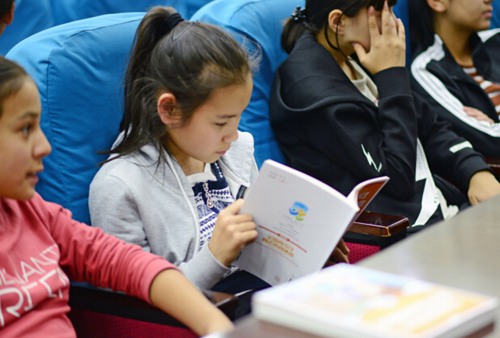 |
|
A student reads an educational textbook at the launching ceremony of a campaign to popularize knowledge of the law on Sept 16. [Photo/ Agencies] |
Innovation finds frequent mention in the 13th Five-Year Plan (2016-20). Innovation has also become a buzzword in almost every walk of life, especially education. And innovation in the field of education means not just innovation in education, but also promotion of social innovation through education.
China's education process has been criticized for not contributing enough to social innovation. But to promote social innovation, education should first become innovative itself. Many so-called educational innovation techniques have been tried, but they only carried the tag of innovation, with some even being anti-innovation in nature.
For instance, when a kindergarten teacher assigns "innovative" homework to 4-year-old children, requiring them to collect waste to make a television set, he/she is essentially assigning homework to their parents. Also, some schools have developed an app that allows parents to watch how a teacher teaches a class and assess their children's performance in real time. But it is actually a kind of monitoring and surveillance, not innovative interaction.
That the education process is devoid of a proper management mechanism can be explained through a homework assignment. Whether a homework assignment is appropriate and can benefit students require peer review by teachers and educators, so it should not be randomly implemented by administrators or teachers in the name of innovation. Schools offering strange courses or implementing teaching reform randomly have created controversies, which can be attributed to the lack of a proper innovation mechanism for education.
A basic educational management and evaluation mechanism is needed to promote innovation. The national education outline says primary and middle schools should introduce democratic management and establish a modern school system so as to improve the schooling and teaching quality, and promote innovation in China's basic education system. Without democratic management and a modern school system, schools might deviate from or violate the elementary education law, which will not be conducive to promoting innovation.
In recent years, some of China's primary and middle schools have paid too much emphasis on examination-oriented education, because the leaders of those institutions believe that increasing the admission rate of their students in elite institutions is the top priority of education and will satisfy parents. But in doing so, they have ignored the opinions of students and their parents, as well as failed to evaluate the long-term influence of exam-centric education on students.
Basically, a modern school system is supposed to clarify the rights and responsibilities of administrators, operators and educators. Without clear definitions, some administrators could end up violating some basic rules by implementing their misplaced concepts of innovation. For instance, some administrators have introduced quality education review in the name of promoting the quality of education, which could become administrative reviews for the schools.
In some other schools, the administrators have made students kowtow to their parents in the name of promoting traditional education. Whether students would like to do so should be there personal choice; it should not be forced upon them by the school. Moreover, such a move is not conducive to cultivating students' individuality.
China recently launched a plan to build world-class colleges to promote innovation. But if we can't properly deal with the relationship between the administrators and schools, the ever-increasing power in the hands of administrators could impede the independent functioning of schools.
Overemphasis on administration and utilitarianism in higher education seriously hinders the cultivation of innovative talents. Without solving this fundamental problem, it will be difficult for colleges to promote innovation.
Sticking to the bottom line of the principles of education is a prerequisite for educational innovation. And China's education authorities should make it their top priority to build a modern school system. If administrators and educators want to pursue innovation, they should first establish a modern school system. Under the modern school system, educators and students both will have a greater sense of independence, which is the basis of innovation. And only then can China's innovative capability start expanding.
The author is vice-president of the 21st Century Education Research Institute.

I’ve lived in China for quite a considerable time including my graduate school years, travelled and worked in a few cities and still choose my destination taking into consideration the density of smog or PM2.5 particulate matter in the region.